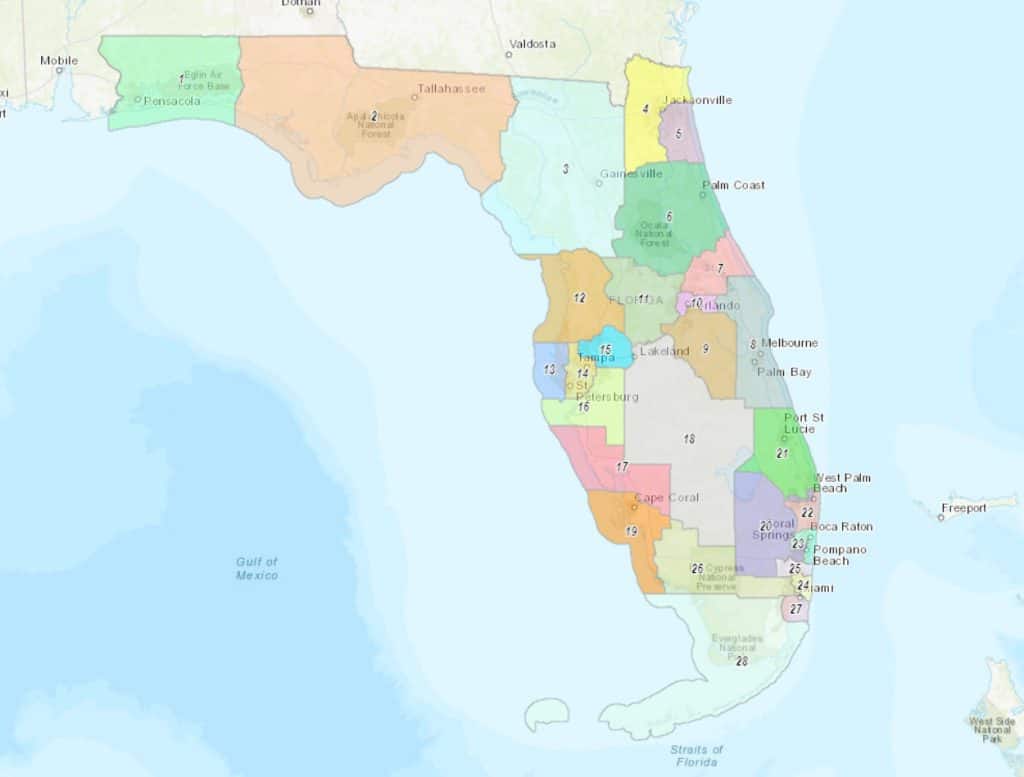A Republican-favorable congressional redistricting plan that Gov. Ron DeSantis’ office released Wednesday landed quick support from the leader of the Senate’s reapportionment efforts.
Democrats, meanwhile, said the once-a-decade redistricting process has gone “extreme partisan” and threatened legal challenges.
State lawmakers will return to Tallahassee next week for a special session after DeSantis vetoed a congressional map passed during this year’s regular session. Senate Reapportionment Chairman Ray Rodrigues, R-Estero, found the plan released Wednesday by the governor’s office more than acceptable.
“After thoroughly reviewing the governor’s submission and a discussion with our legal counsel, I have determined that the governor’s map reflects standards the Senate can support,” Rodrigues wrote in a memo to senators.
Rodrigues said the “proposal comes following meaningful discussions with our Senate legal counsel” and that he had been brief Tuesday by the governor’s staff on the design.
Ryan Newman, general counsel for DeSantis, said in a letter Wednesday to Rodrigues that the proposal incorporated pieces of earlier maps recommended by the governor’s office. Newman’s letter said the proposal “eliminates the racially gerrymandered” Congressional District 5, which currently stretches from Jacksonville to west of Tallahassee, and makes changes to districts in the Tampa region.
The governor’s proposal would go along with new lines that the Legislature pitched for the Panhandle and Southeast Florida.
District 5 in North Florida has spurred the most controversy, as it was drawn in the past to help elect a Black candidate. It is held by U.S. Rep. Al Lawson, a Black Democrat.
On Tuesday, DeSantis said the district would be redrawn in a “race-neutral manner.”
In vetoing the congressional map passed by the Legislature, DeSantis argued that it violated the Equal Protection Clause of the U.S. Constitution, in part because of District 5. He also raised concerns about how lawmakers interpreted the “Fair Districts” constitutional amendments, which voters passed in 2010 to try to prevent gerrymandering.
Senate President Wilton Simpson, R-Trilby, and House Speaker Chris Sprowls, R-Palm Harbor, announced Monday that DeSantis would propose a map for the special session. It is highly unusual for the governor to take the lead on proposing maps.
Florida Democratic Party Chairman Manny Diaz released a statement early Wednesday evening blasting DeSantis’ proposal and legislative leaders.
“It is appalling, but not surprising, that the Republican Legislature has abdicated its constitutional duty to draft and pass congressional maps to the governor,” Diaz said. “As proven by the proposed map released today, Gov. DeSantis is hell-bent on eliminating congressional seats where Florida’s minority communities have the ability to elect representatives of their choice and he is imposing his own partisan political preferences on Florida’s congressional map.”
The congressional redistricting process is already the subject of a federal lawsuit, and more litigation is anticipated once new lines are approved. The special session will start Tuesday.
“If this map is enacted, Florida will be sued.,” tweeted Marc Elias, a Democratic Party elections lawyer.
Matt Isbell, a Tallahassee-based analyst who has worked for Democrats, tweeted Wednesday that with DeSantis’ proposal, the number of Republican-held congressional seats would be expected to grow from the current 16 to 20, based on 2020 voting patterns.
Democrats would have advantages in one district in the Tampa region, two in the Orlando area and five in South Florida. The state’s overall number of congressional seats is increasing this year from 27 to 28 because of population growth.
Sen. Linda Stewart, D-Orlando, tweeted that the redistricting process has gone “from nonpartisan to extreme partisan.”
The maps DeSantis vetoed last month would have led to 18 Republican-friendly districts.
Members of Rodrigues’ committee will get a briefing from the governor’s staff on the proposed map Tuesday afternoon.
The House Congressional Redistricting Subcommittee will meet separately Tuesday afternoon.
Rodrigues wrote that the governor’s proposal “incorporates many of the features” the Senate approved during the regular session.
“As we have stated from the beginning, the goal is to produce a congressional map for our state that gains majority votes on the House and Senate floors, is signed by the governor and becomes law according to the consensus process outlined in our Constitution,” Rodrigues wrote.
When the House and Senate passed their now-vetoed proposal March 4, Rodrigues argued on the Senate floor that the plan would hold up to a review by the Florida Supreme Court, as it followed court guidance on the handling of minority-access seats.
“It is clear that we are preserving the opportunity for minority voters, which makes it constitutional,” Rodrigues said at the time.
Visit Tampafp.com for Politics, Tampa Area Local News, Sports, and National Headlines. Support journalism by clicking here to our GiveSendGo or sign up for our free newsletter by clicking here.
Android Users, Click Here To Download The Free Press App And Never Miss A Story. Follow Us On Facebook Here Or Twitter Here.


